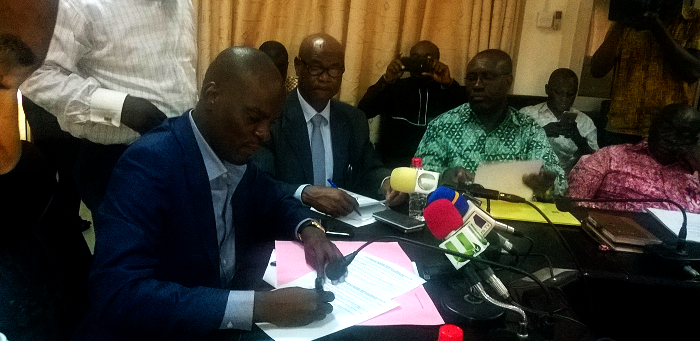
Govt announces new minimum wage
The government has announced an increase in the daily minimum wage (DMW) by 10 per cent, with effect from January 1, 2017.
Advertisement
This means the minimum wage has now been pegged at GH₵8.80, as against GH₵8 in 2016.
The decision was arrived at after the National Tripartite Committee (NTC), comprising the government, organised labour and the Ghana Employers Association (GEA), concluded negotiations in Accra yesterday.
The Minister of Employment and Labour Relations, Mr Haruna Iddrisu, signed on behalf of the government, while the Secretary General of the Trades Union Congress (TUC), Dr Yaw Baah, signed for organised, with the President of the GEA, Mr Terry R. Darko, signing on behalf of employers.
Daily minimum wage
The DMW is the national floor wage — the lowest pay a worker in Ghana must receive for any work he or she carries out.
It is a negotiated amount set by and among workers’ representatives, employers and the government consulting as the NTC.
The DMW serves as a national index for wages and salaries across the country, including the setting of a base pay (basic salaries) and, therefore, has a significant impact on the national economy.
Implementation
Announcing the new DMW, Mr Iddrisu called on employers in the various sectors to adjust and take the necessary steps to implement the new wage by the beginning of next year.
He said the government would soon put in place a task force which would visit the various institutions and companies to ensure that they were making preparations to adjust to the new base salary.
He added that very soon the Attorney-General’s Department would gazette the new arrangement and institutions which flouted the directive would not be spared.
“The NTC recommends that the minimum wage should be tax exempt and reiterates its commitment to the improvement of incomes and productivity in both the public and the private sectors,” he said.
The minister gave an assurance that domestic workers’ regulations were in the offing to protect domestic workers, noting that they were usually not treated fairly by their employers in the informal sector.
Inadequate profits
For his part, Mr Darko said employers were making huge losses and struggling to pay their workers, “but an impression has been created that they make a lot of profit”.
In spite of that, he said, members of the GEA would comply with the directive and implement it fully, effective January 2017.
Even though the increment was not as high as this year’s, Dr Baah indicated that if employers complied with it fully, it would benefit workers immensely.
He lauded the government’s decision to enact laws to protect workers in the informal sector, since they were vulnerable and were treated unfairly.
Concerns of workers
Like all workers globally, employees in the country continue to agitate for better wages and salaries and usually fight governments over ‘what is due them’.
With the full implementation of the Single Spine Salary Structure (SSSS), workers thought their struggles were over, but they continue to agitate and fight the government due to what they describe as unfairness on the part of employers.
The Civil and Local Government Staff Association, Ghana (CLOGSAG) returned to work barely a month ago after fighting the government over interim market premium for close to a month.
Currently, the Government and Hospital Pharmacists Association (GHOSPA) is also on the neck of the government over its interim market premium due to the essential services its members provide.



